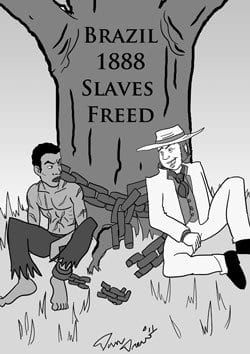
Brazil’s untapped power in numbers
The PBS television series “Black in Latin America” provides an opportunity to assess the history of African slaves in other Western Hemisphere countries. Especially important is the segment on Brazil, which has the largest black population outside of Nigeria.
There are 38.9 million blacks in the United States. According to the 2000 census there are 75.9 million citizens of Brazil who would be classified as African American in the U.S. Since there are only 91.3 million Brazilian whites, who dominate the country, one wonders why so many blacks are living in poverty in favelas (slums). Brazil is a democratic society and blacks are not hopelessly outnumbered.
Black Brazilians have thus far been unable to organize a political movement to improve their conditions. Is this an example of an impediment caused by a cultural slave mentality? Slavery was not abolished in Brazil until May 13, 1888 after slave revolts disrupted the nation.
Many Brazilians living today had grandparents and great grandparents who were slaves. Perhaps it takes many generations to become free of the slave mentality that oppresses the assertive conduct necessary to become self-reliant and to prosper.
Working for the taxpayers
Many citizens believe that government is by nature inefficient and taxes paid are not money well spent. Cost effectiveness is not as critical in government operations as in private industry, people believe, because taxpayers will always be called upon to finance the inefficiencies.
One way to require a higher standard of operations is for a professionally competent state auditor to enforce efficiency on government. Everyone agrees that efficiency will save taxpayer’s funds.
Few voters had any hope of that happening. The state auditor has the responsibility to investigate the operation of the state agencies to uncover fraud, to assure that funds are spent only on authorized functions, and to evaluate whether the goals and objectives of the program funded are being achieved. However, there is no requirement that candidates for state auditor meet any professional qualifications to assure that they are able to do the job.
Early indications are that Suzanne Bump is just the sort of state auditor that the people have been waiting for. Wisely, she commissioned an external peer review of the office by the National State Auditors Association for the 18 months prior to her taking office. The resulting opinion serves as the basis for her modernization of the office.
Joseph DeNucci held the post for 24 years before Bump’s election. He is a well liked former boxer who became an icon on Beacon Hill. As often happened in politics, personal relationships of many years induced him to tolerate a standard of performance from some employees that was less than what should be expected.
With the results of the review in hand, Bump fired 27 agency employees and another 10 left for personal reasons. Now her office has 226 employees and an annual budget of $16.8 million.
The country is recovering slowly from a severe and extended recession. Taxpayers are more militant now than ever before about the frugal and efficient expenditure of public funds. It is time for transparency and hard nosed auditing






